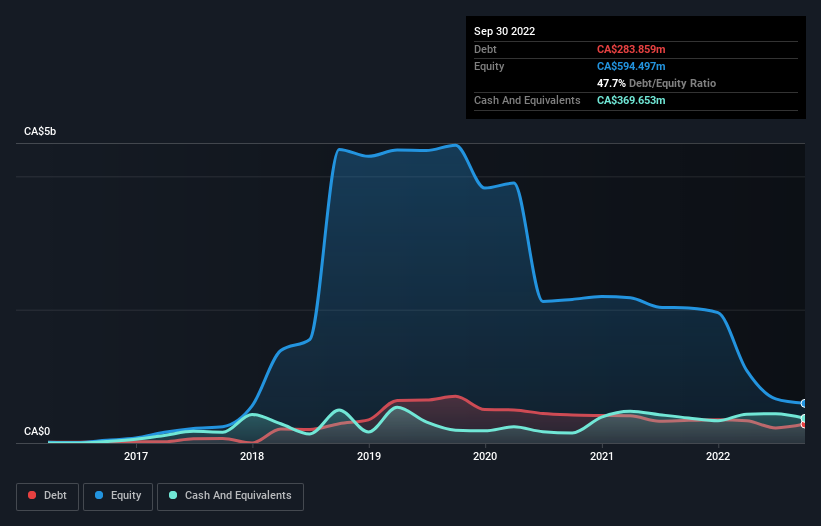
David Iben put it well when he said, 'Volatility is not a risk we care about. What we care about is avoiding the permanent loss of capital.' So it seems the smart money knows that debt - which is usually involved in bankruptcies - is a very important factor, when you assess how risky a company is. We can see that Aurora Cannabis Inc. (TSE:ACB) does use debt in its business. But the real question is whether this debt is making the company risky.
When Is Debt A Problem?
Debt assists a business until the business has trouble paying it off, either with new capital or with free cash flow. Ultimately, if the company can't fulfill its legal obligations to repay debt, shareholders could walk away with nothing. However, a more usual (but still expensive) situation is where a company must dilute shareholders at a cheap share price simply to get debt under control. Of course, the upside of debt is that it often represents cheap capital, especially when it replaces dilution in a company with the ability to reinvest at high rates of return. The first thing to do when considering how much debt a business uses is to look at its cash and debt together.
Check out our latest analysis for Aurora Cannabis
What Is Aurora Cannabis's Net Debt?
The image below, which you can click on for greater detail, shows that Aurora Cannabis had debt of CA$283.9m at the end of September 2022, a reduction from CA$339.6m over a year. However, its balance sheet shows it holds CA$369.7m in cash, so it actually has CA$85.8m net cash.

How Healthy Is Aurora Cannabis' Balance Sheet?
The latest balance sheet data shows that Aurora Cannabis had liabilities of CA$167.6m due within a year, and liabilities of CA$407.8m falling due after that. Offsetting this, it had CA$369.7m in cash and CA$45.9m in receivables that were due within 12 months. So its liabilities outweigh the sum of its cash and (near-term) receivables by CA$159.8m.
While this might seem like a lot, it is not so bad since Aurora Cannabis has a market capitalization of CA$446.0m, and so it could probably strengthen its balance sheet by raising capital if it needed to. But we definitely want to keep our eyes open to indications that its debt is bringing too much risk. While it does have liabilities worth noting, Aurora Cannabis also has more cash than debt, so we're pretty confident it can manage its debt safely. The balance sheet is clearly the area to focus on when you are analysing debt. But it is future earnings, more than anything, that will determine Aurora Cannabis's ability to maintain a healthy balance sheet going forward. So if you want to see what the professionals think, you might find this free report on analyst profit forecasts to be interesting.
Over 12 months, Aurora Cannabis made a loss at the EBIT level, and saw its revenue drop to CA$210m, which is a fall of 11%. We would much prefer see growth.
So How Risky Is Aurora Cannabis?
Statistically speaking companies that lose money are riskier than those that make money. And in the last year Aurora Cannabis had an earnings before interest and tax (EBIT) loss, truth be told. And over the same period it saw negative free cash outflow of CA$152m and booked a CA$1.8b accounting loss. With only CA$85.8m on the balance sheet, it would appear that its going to need to raise capital again soon. Summing up, we're a little skeptical of this one, as it seems fairly risky in the absence of free cashflow. The balance sheet is clearly the area to focus on when you are analysing debt. But ultimately, every company can contain risks that exist outside of the balance sheet. For example Aurora Cannabis has 2 warning signs (and 1 which is significant) we think you should know about.
At the end of the day, it's often better to focus on companies that are free from net debt. You can access our special list of such companies (all with a track record of profit growth). It's free.
New: Manage All Your Stock Portfolios in One Place
We've created the ultimate portfolio companion for stock investors, and it's free.
• Connect an unlimited number of Portfolios and see your total in one currency
• Be alerted to new Warning Signs or Risks via email or mobile
• Track the Fair Value of your stocks
Have feedback on this article? Concerned about the content? Get in touch with us directly. Alternatively, email editorial-team (at) simplywallst.com.
This article by Simply Wall St is general in nature. We provide commentary based on historical data and analyst forecasts only using an unbiased methodology and our articles are not intended to be financial advice. It does not constitute a recommendation to buy or sell any stock, and does not take account of your objectives, or your financial situation. We aim to bring you long-term focused analysis driven by fundamental data. Note that our analysis may not factor in the latest price-sensitive company announcements or qualitative material. Simply Wall St has no position in any stocks mentioned.
About TSX:ACB
Aurora Cannabis
Engages in the production, distribution, and sale of cannabis and cannabis-derivative products in Canada and internationally.
Undervalued with excellent balance sheet.

